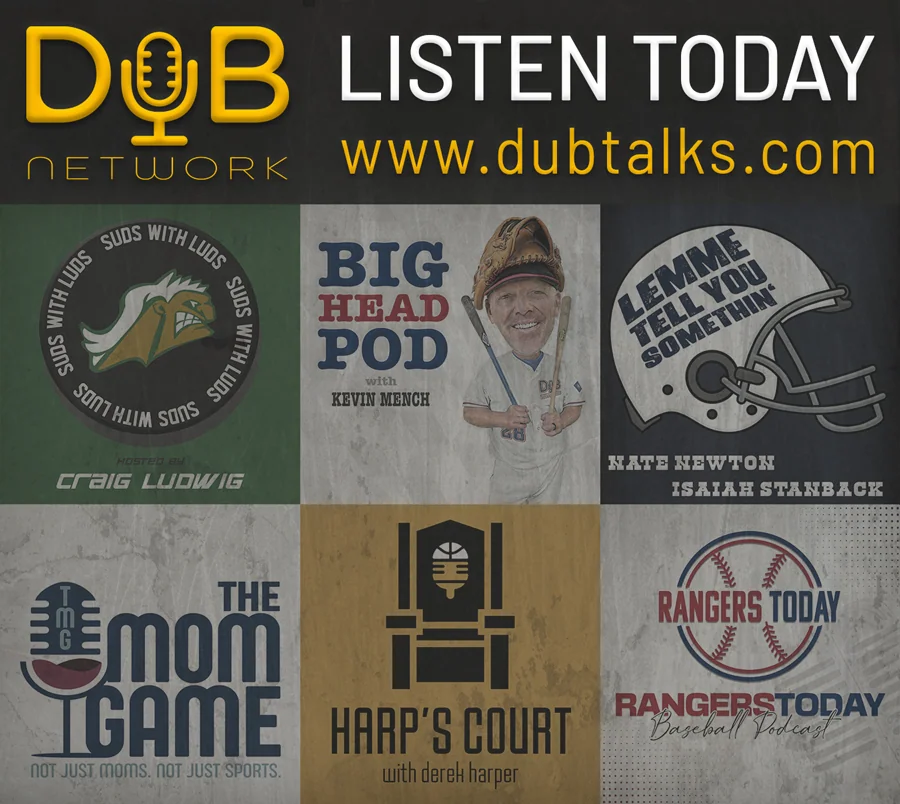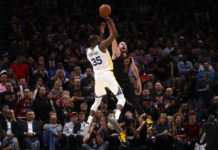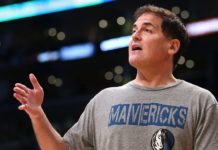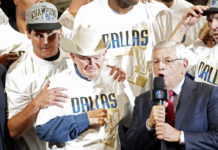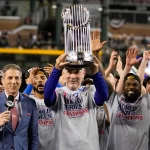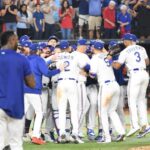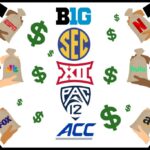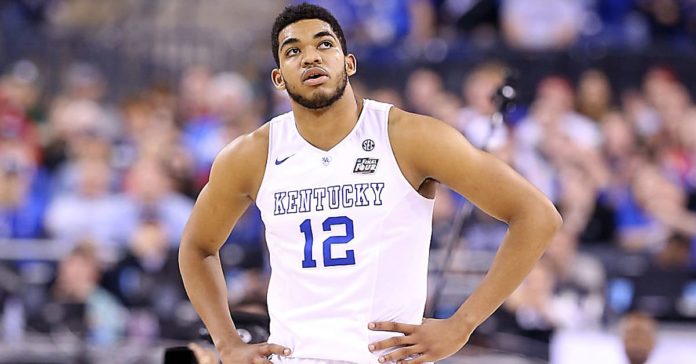
As a fan of the New York Knicks, the last Thursday in June is always the worst night of the NBA year for me. This year was, of course, no different. Even with Phil Jackson in charge, the Knicks still managed to botch their chance at a potentially franchise-changing draft by passing up on Emmanuel Mudiay, Justise Winslow, and a slew of appealing trades to instead draft Kristaps Porzingis. Am I being dramatic? Probably. But as a Knicks fan, there are only so many times during the year to be optimistic, so it is disappointing when one of those rare times doesn’t go their way.
But this article isn’t all about the Knicks and their inability to perform on draft night. I’m going look at the NBA in totality to give you my four winners and four losers (and I will leave out the Knicks for the sake of objectivity) from last night, while refraining from giving draft grades that are impossible to hand out with any accuracy until 5 or 6 years down the road.
Winners:
Minnesota Timberwolves: The last couple of drafting seasons for the Timberwolves have mainly involved the team moving down in the draft and missing out on some quality talent like Trey Burke, Austin Rivers, and Terrence Jones. However, last year the team seemed to turn the tide after the draft by getting the first overall pick (and eventual Rookie of the Year) Andrew Wiggins for the expiring contract of Kevin Love. The budding talent of Wiggins, Zach LaVine (last year’s 13th overall pick), Nicola Pekovic, Ricky Rubio, and veterans like Kevin Garnett and Kevin Martin allowed the Timberwolves to be more aggressive in this year’s draft than they have in the last couple of seasons. Karl-Anthony Towns was the obvious pick at the first spot in this year’s draft, and if he was the only player that Minnesota had drafted, it would have been a very successful year. But, the Timberwolves also traded two second round picks to acquire Tyus Jones, who played point guard at Duke. Jones is a proven winner who was a fringe lottery pick that dropped in the draft, and Minnesota was lucky to scoop him up at number 24. Jones adds much needed depth for the Wolves’ guards, and Towns has the potential to be a major force in this league for many years to come.
Boston Celtics: The Celtics had a lot of draft picks this year, and many thought that they might try to stockpile them and trade up. Instead, the Celtics made what I believe to be the correct decision by using the picks to add depth to their team. They didn’t add a major star, but they added role players who will be able to help this team, especially if they have to trade some of their bigger names to sign players like Kevin Love and Robin Lopez in the offseason. Terry Rozier, a point guard from Louisville, gives the Celtics some flexibility with their first round pick from last year, Marcus Smart. They can either start Smart and have a solid player off of the bench in Rozier. Or, the Celtics can trade Smart to add another piece and give Rozier the reins in this offense. Boston also drafted Jordan Mickey, a power forward from LSU who led the NCAA Division 1 in blocks last season. Furthermore, the team addressed their biggest need (three point shooting) by drafting R.J. Hunter and Marcus Thornton, two three point shooting guards who each averaged 20 points per game last season.
Atlanta Hawks: The Hawks made a mockery of the Nets in 2012 when they traded Joe Johnson to the team and received five players and three draft picks from the team. One of those draft picks gave the Hawks the right to swap first rounders with the Nets in 2015, which is exactly what they did this season. Instead of picking 29th in the draft, the Hawks moved up to the number 15 slot and promptly traded away the pick to the Wizards for two second rounders and Tim Hardaway Jr. from the Knicks. The Hawks were able to avoid having to pick a guard/forward in the middle of the first round and be locked into a contract for the next four years by making this trade, and received a solid role player in return. Hardaway Jr. should be able to contribute off of the bench to the team who finished first in the East last season, but if he doesn’t, his contract stipulates a club option for 2016. Essentially, instead of taking a shot on a college kid, the Hawks are taking a shot on a proven two-year veteran. In the second round the Hawks drafted Marcus Ericson, a 6’7” shooting guard who played for Barcelona last season, and Dimitrios Agravanis, a 6’10” power forward who played in Greece last season, with the 50th and 59th picks, respectively. Each player adds size and depth off of the bench.
Justise Winslow: Duke’s Winslow was certainly upset to have dropped to the number 10 spot in the draft, but in the long run I think that he will be thanking all of the GMs who passed on him. Instead of ending up on a rebuilding franchise like the Magic, Kings, or Pistons, Winslow joins the Heat, who made four straight NBA Finals before missing the playoffs last season. Even though the Heat no longer have LeBron James and may lose Dwyane Wade to free agency, the team still has Goran Dragic, Loul Deng, Chris Bosh, and Hassan Whiteside on their roster. Adding Winslow to that team makes them a legitimate playoff threat, which bodes well for the start of his career. Also boding well for his career is the opportunity to learn from and play alongside some of these really good players, while not being expected to be “the man” right away.
Losers:
Philadelphia 76ers: It’s hard to know where to even begin with the 76ers. As a team that has Ish Smith and Robert Covington as its starting guards, it is obvious After the Lakers surprised a lot of people by taking Russell second overall, the 76ers were left with the choice of taking “best available” (Jahlil Okafor) or “team need” (Emmanuel Mudiay). The team went with “best available” and have now created a logjam at the center position with Okafor joining Joel Embiid and Nerlens Noel. To make matters worse, four of the five selections made by the 76ers in the second round (one was traded to the NY Knicks) were either a power forward or a center. And, the one pick that was not a big man is J.P. Tokoto, a wing player who is more known for his defense than his offense, which is something that the 76ers desperately need. This year presented a major opportunity for Philadelphia to either fill a need through the draft or acquire a lot of talent by trading the third overall pick, but the 76ers missed their opportunity by drafting a player, Okafor, that they didn’t even invite for a private workout.
Charlotte Hornets: The Hornets were in a similar situation as the 76ers when they made the 9th overall pick in the draft. Winslow would have perfectly filled an offensive need on the wing for the Hornets. However, the Hornets elected to draft Frank Kaminsky, a power forward from Wisconsin. While Kaminsky is a good player who has potential to be a big talent in the NBA, the Hornets already have Cody Zeller and Spencer Hawes who are big men that can shoot the ball outside and play little defense. The Hornets now have also clogged up their power forward and center positions with similar players who will either be forced to fight for minutes or be traded. In the second round, the Hornets traded the 39th overall pick to the Nets for two future second round picks, which was a good trade, but it does not make up for the pick in the first round that I think they will really regret 10 years from now.
Brooklyn Nets: Just like the 76ers, it’s hard to even know where to begin with the Nets. As mentioned earlier, they already started the draft at a disadvantage because of their swapped pick with the Hawks. At 29th overall, the Nets selected Chris McCullough, a power forward from Syracuse who fills a need but is coming off of a serious knee injury which often can be tough for a big man to overcome. In the second round, the Nets used the Hornets’ 39th overall pick to draft Juan Vaulet, who missed his entire season last year in Argentina with a foot injury. Despite taking two injury plagued players in the draft, the Nets’ worst move of the night came at the 41st overall spot in the draft. The Nets drafted Pat Connaughton, a shooting guard from Notre Dame, and immediately traded him and center Mason Plumlee to the Trail Blazers for Rondae Hollis-Jefferson and Steve Blake. The Blazers drafted the athletic wing Hollis-Jefferson with the 23rd overall pick, after he averaged 10 points and 6 rebounds per game in two seasons at Arizona. While it remains to be seen how Hollis-Jefferson’s career will turn out, Mason Plumlee was the lone bright spot on a Nets team that never should have made the postseason this past year. The trade leaves just one center on the team for the Nets, Brook Lopez, and Lopez is likely to opt out of his contract this summer. Also, if the Nets were willing to trade Plumlee, it is inexplicable why general manager Billy King didn’t finalize a deal that would have sent Plumlee and the odious contract of Deron Williams to the Kings in December. The Nets may be the biggest losers of the 2015 NBA draft.
Willie Cauley-Stein: It’s hard to call the sixth overall pick one of the losers of the draft, but that’s just what Kentucky’s Cauley-Stein is as he enters a no-win situation with the Sacramento Kings. Much had been made of a possible trade that would have sent center DeMarcus Cousins out of Sacramento, but the deal did not come to pass during this year’s draft. It is still likely that either Cousins will be traded or coach George Karl will be fired before the start of next season, but either way Cauley-Stein will be entering stormy waters. If Cousins is not traded, Cauley-Stein will be forced to play a lot of minutes as the second center on the court. This could create a lot of issues in today’s fast-paced NBA, and it could create some locker room tension with Cousins who has shown a need to be the focal point of the team. The second scenario for Cauley-Stein is equally bad, and it involves Karl keeping his job and Cousins being traded. This will leave a lot of angry Kings fans in Sacramento who will be none-too-pleased to find out that their Cousins replacement has virtually no offensive game. He is a defensive stud, but he will not fill in the role of the star offensive player that Cousins is. This makes it difficult for Cauley-Stein, who will have to make a lot of adjustments no matter what happens with the rest of his team this off-season.


